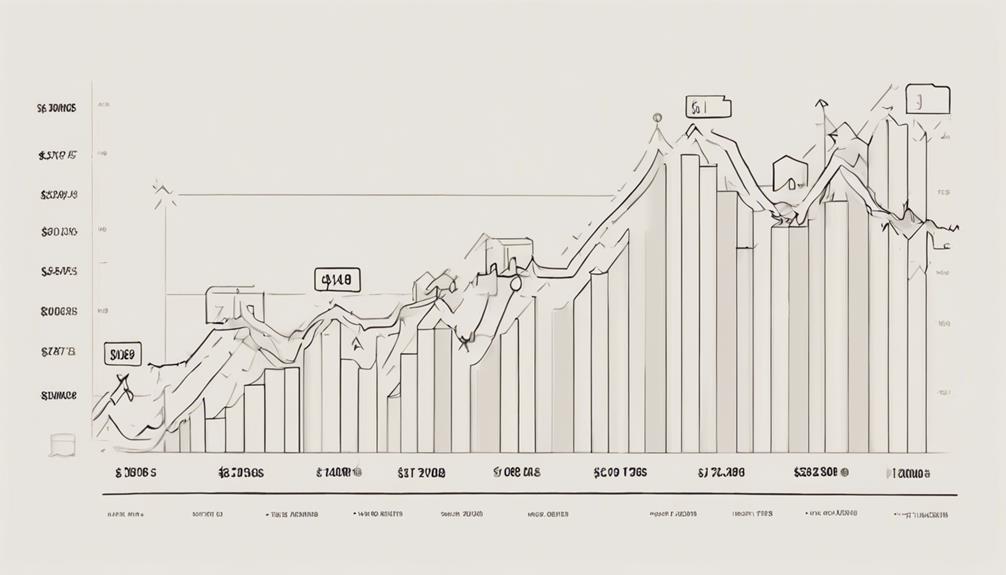A mortgage, a fundamental component of real estate transactions, provides individuals with the means to acquire property by leveraging their assets. This financial instrument, defined by its structured repayment terms and ties to the property itself, plays a crucial role in the housing market. By examining the intricacies of mortgages, one can gain insight into the complexities of homeownership, financial planning, and investment strategies. Understanding the nuances of mortgages, including rates, types, and implications, is essential to making informed decisions in the realm of real estate finance.
Key Takeaways
- Mortgages enable property acquisition by leveraging assets with fixed monthly repayments.
- Interest rates influence the total repayment amount, impacting affordability.
- Failing mortgage obligations can lead to foreclosure risks.
- Understanding mortgage terms is crucial for informed decisions in real estate finance.
Understanding Mortgages

In the realm of personal finance, a mortgage stands as a pivotal financial instrument enabling individuals to acquire real estate by leveraging the property itself as collateral. When individuals seek to purchase a home through a mortgage, they are essentially taking out a loan from a lender, agreeing to repay the borrowed amount along with interest over a predetermined period. This repayment is typically structured into fixed monthly payments, allowing borrowers to budget and plan their finances accordingly. The interest rate attached to the mortgage plays a crucial role in determining the overall costs of the loan, impacting the total amount repaid.
Moreover, failing to meet mortgage obligations can lead to severe consequences such as foreclosure, where the lender may seize the property due to non-payment. Therefore, comprehending the intricacies of mortgages is vital for those navigating the homebuying process, as it involves significant financial responsibilities and long-term commitments. By understanding the terms, costs, and obligations associated with mortgages, individuals can make informed decisions and secure their financial future.
Role of Mortgages in Home Buying
Mortgages play a crucial role in the home buying process by enabling individuals to afford a property through financing. One key aspect is the down payment required at the outset, which varies based on the type of mortgage chosen. Understanding the approval process for mortgages is essential for navigating the complexities of securing a loan for a home purchase.
Mortgage Down Payments
How does the size of a mortgage down payment influence the affordability of a home purchase? Mortgage down payments typically range from 3% to 20% of the home's purchase price. Larger down payments can lower monthly mortgage payments and interest costs, making the overall loan more affordable in the long run. However, down payments below 20% often require private mortgage insurance (PMI) to protect the lender, adding to the costs. Fortunately, some loan programs offer down payment assistance for eligible homebuyers, helping make homeownership more accessible. Homebuyers must carefully consider the down payment amount as it directly impacts the affordability of the home purchase and their eligibility for certain loan programs.
Types of Mortgages
The various types of mortgages play a crucial role in facilitating the process of home buying by offering diverse financing options tailored to meet the specific needs and circumstances of individual borrowers. Fixed-rate mortgages ensure stable monthly payments throughout the loan term, providing predictability for budgeting. In contrast, adjustable-rate mortgages (ARM) offer fluctuating interest rates after an initial period, which can result in varying payments. Government-backed loans such as FHA, VA, and USDA loans cater to different eligibility criteria and often provide benefits like lower down payment requirements. Understanding these mortgage options and their implications on loan terms and eligibility criteria is essential for prospective homebuyers to make informed decisions when securing financing for their real estate purchase.
Mortgage Approval Process
In the realm of real estate transactions, the approval process for mortgages stands as a pivotal juncture, meticulously analyzing a borrower's financial credentials to determine their eligibility for securing a home loan.
- Lenders evaluate creditworthiness, income documentation, and financial stability.
- The process determines the maximum loan amount and interest rate.
- Pre-approval provides insight into the borrower's budget, aiding in competitive offers.
Mortgage approval involves scrutinizing employment history, income documentation, and credit score to evaluate the borrower's capacity to repay the loan. This meticulous assessment is crucial in the home buying journey, ensuring that borrowers secure suitable financing for their new homes.
Types of Mortgages Explained
Various mortgage options cater to different financial situations and goals, offering diverse terms and requirements to accommodate a range of borrowers. Conventional mortgages typically necessitate a 20% down payment, making them suitable for borrowers with stronger financial profiles. FHA mortgages are favored by first-time buyers or those with lower credit scores since they offer more lenient credit requirements and lower down payment options. VA loans provide an attractive option for eligible military service members as they allow for no-down payment financing. On the other hand, jumbo loans cater to individuals looking to purchase high-priced properties that exceed the conforming loan limits set by government-sponsored enterprises. USDA loans target individuals seeking financing for rural home purchases, offering low or even no down payment options to facilitate affordable homeownership in rural areas. Understanding the different types of mortgages available can help borrowers make informed decisions based on their unique financial circumstances and homeownership goals.
Mortgage Rates Overview

Analyzing the fluctuations in mortgage rates provides valuable insights for individuals navigating the housing market. Understanding the dynamics of interest rates is crucial when planning for a home purchase. Here are some key points to consider:
- Mortgage rates play a significant role in determining monthly payments. Higher rates lead to increased monthly payments, impacting a borrower's budgeting and financial planning.
- The total cost of homeownership is heavily influenced by the mortgage rates secured. Even a small difference in rates can translate to substantial savings or expenses over the life of the loan.
- Comparing mortgage rates from different lenders is essential. By exploring various financing options, borrowers can find the most competitive rates tailored to their financial situation, potentially saving money in the long run.
Utilizing online mortgage calculators can aid in comprehensively evaluating the financial implications of different mortgage rates, enabling informed decisions when entering the housing market.
Comparing Mortgage Options
When comparing mortgage options, it is essential to focus on interest rates as they significantly impact the overall cost of borrowing. Additionally, analyzing loan terms is crucial in determining the duration and structure of the mortgage. By considering these factors, borrowers can make informed decisions that align with their financial objectives.
Rate Comparison Tips
When comparing different mortgage options, it is essential to thoroughly assess various factors such as loan size, closing costs, and APR to make an informed decision. Utilize online tools and calculators to estimate monthly payments for each option. Consider these important tips for rate comparison:
- Compare mortgage rates from different lenders to find the best offer.
- Look at the total cost of the loan over its term, not just the initial rate.
- Understand the impact of different interest rates on your overall loan repayment amount.
Loan Term Considerations
Considering the loan term is a critical factor in effectively comparing different mortgage options. Loan terms typically range from 10 to 30 years, with shorter terms like 15 years usually offering lower interest rates. While longer terms such as 30 years result in lower monthly payments, they incur higher overall interest costs. Balancing affordability with long-term interest savings is key when choosing the right loan term. It's essential to align the loan term with your financial goals and homeownership timeline. The table below summarizes the key considerations for 15-year and 30-year mortgages:
| Loan Term Considerations | 15 Years | 30 Years |
|---|---|---|
| Interest Rates | Generally lower | Higher |
| Monthly Payments | Higher | Lower |
| Long-Term Interest Savings | Potential for significant savings | Lower savings |
| Financial Goals | Faster equity build-up, higher payments | Lower payments, longer time to build equity |
| Timeline | Quicker payoff | Longer payoff |
Importance of Mortgages in Real Estate

The significance of mortgages in the real estate sector cannot be overstated, as they serve as the cornerstone for enabling individuals to achieve homeownership by providing access to substantial financial resources over an extended period.
Importance of Mortgages in Real Estate:
- Mortgages are essential for most people to afford buying a home, as they provide access to large sums of money over a extended period, making homeownership more achievable.
- They allow individuals to spread the cost of a home purchase over many years, thereby increasing the number of potential buyers and facilitating property transactions.
- The availability of mortgages plays a significant role in stimulating the real estate market and is essential for the overall health and growth of the real estate industry.
Frequently Asked Questions
What Is the Simple Definition of a Mortgage?
A mortgage is a financial agreement between a borrower and a lender to purchase real estate. It involves a set process including loan approval, determining interest rates, a down payment, credit score evaluation, loan terms negotiation, and addressing closing costs. The borrower benefits from homeownership, but the property also requires appraisal to secure the loan. Monthly mortgage payments cover both the borrowed amount and interest, facilitating gradual property ownership.
How Does Mortgages Work?
The loan process for mortgages involves borrowing a sum of money to purchase a home, typically with an agreed upon interest rate that determines the cost of borrowing. Monthly payments cover both the principal amount and accrued interest. Homeownership hinges on timely payments, influenced by credit score for loan approval, down payment for initial investment, property value for equity growth, and potential refinance options. Mortgage insurance protects lenders, and foreclosure may occur if payments are not met.
Does a Mortgage Mean You Own the House?
Despite popular misconceptions, having a mortgage does not equate to owning a house outright. It signifies a financial agreement where a lender provides funds for property purchase, with the house serving as collateral until the mortgage is fully repaid. Homeownership myths often blur the distinction between mortgage obligations and property ownership. Only after fulfilling all loan requirements does ownership transfer, highlighting the importance of understanding real estate reality and financial responsibility in achieving house ownership.
What Is a Mortgage Explained?
The mortgage process encompasses a series of steps involving mortgage rates, payments, terms, types, lenders, refinancing, insurance, pre-approval, and closing costs. Understanding these intricacies is vital for informed decision-making in real estate transactions. By delving into the complexities of the mortgage mechanism, individuals can navigate the financial landscape with clarity and precision. Analyzing the nuances of each aspect empowers borrowers to make sound choices and secure their financial future through responsible homeownership.
Conclusion
In conclusion, mortgages play a crucial role in facilitating home ownership by providing individuals with the necessary funds to purchase real estate. Understanding the different types of mortgages and their associated costs is essential for making informed decisions. Comparing mortgage options allows borrowers to select the most suitable loan for their financial situation. Overall, mortgages are a vital component of the real estate market, acting as a key driver for property transactions. The impact of mortgages on homeownership is nothing short of monumental.
